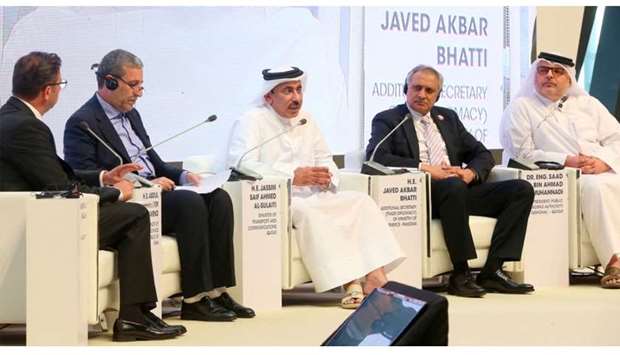Hamad Port has acquired 28% of the trade volume in the Middle East, based on 2017 figures, HE the Minister of Transport and Communications Jassim Seif Ahmed al-Sulaiti has said.
Speaking at a panel discussion on Tuesday at the International Product Exhibition and Conference (IPEC) 2018, being held at the Doha Exhibition and Convention Centre, he noted that Hamad Port’s share in Qatar’s trade volume in terms of exports and imports reached 95%.
“The port has so far received more than 1.5mn TEU (Twenty-Foot Equivalent Unit), more than 100mn tonnes of liquid cargo and more than 1mn livestock (sheep and others), in addition to receiving cars and other various goods,” HE the Minister said.
The panel tackled ‘The Role of Infrastructure in Determining Export and Imports Competitiveness’ at the IPEC session, and highlighted the importance of accelerating the development of various infrastructure projects in Qatar, particularly the Hamad Port.
HE al-Sulaiti stressed that such feat substantially contributes to the economy, especially to people’s daily lives by transporting various goods through Hamad International Airport (between 3.5% and 4%), and Ruwais Port between 1.5% and 2%).
Qatar is now reaping the benefits from Hamad Port’s opening and continuous operations as it “positively impacted the volume of intra-friendly trade between brotherly nations,” according to the Minister.
He also highlighted the Port’s important role in overcoming the blockade on Qatar, preventing the State from incurring huge expenses due to Doha Port’s limited capacity to receive ships.
Citing the vital facility’s various contributions to the country, HE the Minister attributed its achievements on the concerted efforts of Qatar’s wise leadership His Highness the Amir Sheikh Tamim bin Hamad al-Thani and all government officials and employees.
While the blockade hindered a number of trade operations by land, he noted that Qatar has successfully established direct lines via routes from Turkmenistan, Azerbaijan and Turkey (part of the Silk Road).
Qatar also signed agreements with Turkey, as well as India and Pakistan, among others, to further expand its connectivity, increasing trade volumes with these countries.
The first two months of the blockade resulted into increasing the Port’s direct links from 23 direct lines to 75 international destinations, paving the way for Qatar’s exports to grow to more than 1mn TEU.
HE the Minister said Hamad Port’s continuous operations also saw about 500 to 600 TEUs transiting to Iraq and Kuwait, described these figures as impressive compared to previous ones where Qatar relied on intermediate ports.
The blockade opened great economic opportunities for the country, particularly in maritime transport, creating more trade ties and signing 40 agreements, he added.
HE the Minister said the new identity of Qatar Ports confirmed that it is a new launch of the company, through the partnership between Navigation and Citinels.
The new identity allows the ports to embark on a new stage and enter into new investments externally.


